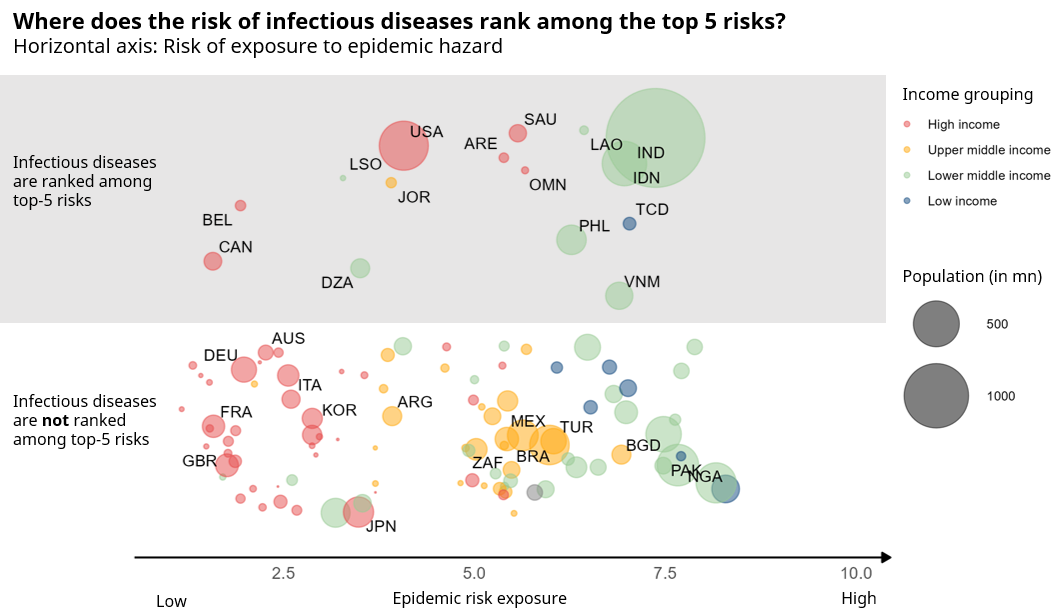
This article is part of the series—Raisina Edit 2024
What about health? Post-pandemic priority shifts
The COVID-19 pandemic and its consequences have largely vanished from headlines in most countries. Yet, its consequences are still running deep; during the COVID-19 pandemic years (2020-23), an estimated 28 million people died, more than what the historical trend for pandemics would have suggested. The pandemic significantly set back the global economy, and also adversely impacted the global fight against poverty. Exhausted from the pandemic response and recovery, public budgets are under pressure, with debt servicing among the least developed countries reaching all-time highs.
Given the numerous conflicts in different parts of the world, it does not seem surprising that health security and pandemic preparedness got pushed down the list of policy priorities. It is not merely a matter of attention; there are hard indicators for problems arising in a world with numerous and protracted violent conflicts. For example, about 131 million people will be forcibly displaced or become stateless in 2024—a figure that doubled since 2015.
Given the numerous conflicts in different parts of the world, it does not seem surprising that health security and pandemic preparedness got pushed down the list of policy priorities.
Nevertheless, pandemics are not less likely or less severe just because one has just happened a few years ago. The notion of pandemics as a “once-in-a-lifetime-event” has increasingly been debunked and replaced with the notion of “once-in-a-generation”.[1] Yet, risk perceptions are different, as is evident from the World Economic Forum’s Executive Opinion Survey. When asked, “Which five risks are the most likely to pose the biggest threat to your country in the next two years?”, only 16 countries out of the 103 surveyed ranked the risk from infectious diseases among the top five risks in the short run. It is disconcerting to see how de-coupled risk perceptions and likelihood of risk exposure have become so shortly after a global health crisis (see figure below).

Source: WEF Global Risks Report 2024, Annex C. Epidemic Hazard Index and population statistics from INFORM Risk Report 2024. World Bank income groupings. Methodology note: There are major shortcomings in the WEF’s dataset. For example, China, South Africa, and Russia are not covered – or at least no data was released. The survey was conducted between April and August 2023, i.e. the conflict in Gaza had not erupted. Analysis CPC Analytics.
For many executives in most countries, health security has been replaced with other priorities. However, in a world plagued with wicked problems, efforts to revive economies, address climate change, and tackle social inequalities must be addressed in tandem with health security. Inaction would be a terrifying option.
Protection against the next pandemic starts at home
For national policymakers, it should remain imperative to heed the lessons learnt from the COVID-19 pandemic. In this article, we want to highlight five key investment areas “at home”.
First, countries need to take proactive steps to prevent outbreaks. This can be achieved by either preventing the emergence of new diseases or minimising spillover events. More than half of known infectious diseases and up to 75 percent of new or emerging infectious diseases (EIDs) are zoonotic. This is further exacerbated by urbanisation, land use, deforestation, global trade and migration. Moreover, the global challenges of climate and health are increasingly interconnected. Exacerbating climate temperatures around the world will likely lead to the emergence and spread of infectious diseases. Addressing these factors as a part of pandemic preparedness is a way to prevent epidemics.
Exacerbating climate temperatures around the world will likely lead to the emergence and spread of infectious diseases.
Second, investment should boost timely detection and early containment of the outbreak at its source. Augmenting surveillance capabilities is paramount for early detection and response to emerging health threats. Leveraging technology and data-driven approaches can strengthen surveillance systems and enable real-time monitoring of disease trends, particularly at the human, animal, and environment interface, to facilitate timely interventions. Some countries have started to invest in cross-sector projects. India’s National One Health Mission is an example in this regard and was recently selected to receive a US$ 25 million grant from the Pandemic Fund to complement the national efforts.
Third, investment for health security is necessary to ensure continued access to quality health services. The COVID-19 pandemic has underscored the critical importance of resilient national health systems as a cornerstone of global health security. Building resilient health systems focuses not only on absorbing unforeseen shocks precipitated during times of an outbreak but also on ensuring continued access to quality healthcare.
Fourth, countries need to invest in reducing inequities in health, particularly amongst the most vulnerable groups in a country. Health emergencies such as COVID-19 exacerbate existing health disparities, disproportionately impacting marginalised communities and underserved populations. Therefore, an effective response for health security cannot be achieved without addressing systemic gaps and ensuring equitable health outcomes.
Building resilient health systems focuses not only on absorbing unforeseen shocks precipitated during times of an outbreak but also on ensuring continued access to quality healthcare.
Lastly, a rapid pandemic response depends on the availability of countermeasures and diagnostics. On the one hand, this requires research and development efforts in vaccines, diagnostics, and therapeutics. On the other hand, it requires sufficient manufacturing capacities. Countries may not necessarily have to build and maintain entirely domestic manufacturing capacities. Interesting regional initiatives are on the way in the African continent, Latin America, the Caribbean, and the ASEAN region to build regional networks for vaccine manufacturing. National policymakers should ensure that they assess these opportunities and potentially contribute to those emerging ecosystems.
Efforts at the national level need to be reaffirmed at the global level
The COVID-19 pandemic reshaped global health governance, emphasising the vital role of multilateralism and health diplomacy in navigating a post-pandemic world. Investments made at the national, regional, and global levels need to function in concert to enhance health security worldwide.
While the central coordinating role of multilateral institutions such as the World Health Organization (WHO) was acknowledged, it also exposed dramatic shortcomings. Calls for reform and revitalisation of multilateral institutions to better address future health challenges triggered a substantial range of efforts: By May this year, 194 countries want to conclude their negotiations on a pandemic agreement that aims to lay the foundations for a more solid architecture for pandemics in the future. The process runs with the International Health Regulations (IHR) update. A new Pandemic Fund with over US$ 1.6 billion financial commitments was created to support low- and middle-income countries in building capacity for pandemic preparedness and response. While the European Union, its member states, and the United States (US) are the largest contributors, China, India, and South Africa contributed substantially. The G20 Presidencies of Italy, Indonesia, India, and Brazil have kept global health on the agenda. The G20 Joint Finance and Health Task Force has brought attention to discussing health investments with the health and finance ministries.
A new Pandemic Fund with over US$ 1.6 billion financial commitments was created to support low- and middle-income countries in building capacity for pandemic preparedness and response.
These efforts are encouraging, however, it is also evident that returning to the pre-pandemic global health world is not possible (nor desirable). The dramatic failure to ensure an equitable distribution of vaccines in 2021 revealed the need to change how we approach global health. This goes beyond the reform of institutions or financing global health initiatives. Mindsets and behaviours have to change or get discarded, such as antiquated notions in which certain countries are custodians of knowledge and expertise and, therefore, better suited to advise the world on dealing with outbreaks.
Ensuring health security is a simple task, albeit not a simplistic one. It will require us to do both: invest domestically in preparedness and response and enhance our ways of cooperation globally. In a year where 49 percent of the world’s voting population is asked to cast their vote in an election, we will see whether the incoming governments utilise this post-COVID-19 window of opportunity to make robust health financing policies and politically commit to public financing mechanisms that work to prepare for future emergencies.
Sahil Deo is a Co-Founder of CPC Analytics
Christian Franz is a co-founder of CPC Analytics
Rithika Sangameshwaran is a Policy Analyst with CPC Analytics.
[1] According to the Center for Global Development, a Washington D.C. based think tank, “there is a 66% probability of a respiratory pandemic that would kill 10 million people” within the next 25 years.
The views expressed above belong to the author(s). ORF research and analyses now available on Telegram! Click here to access our curated content — blogs, longforms and interviews.





 PREV
PREV





